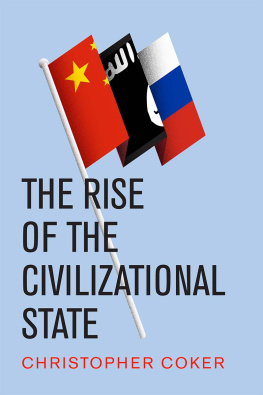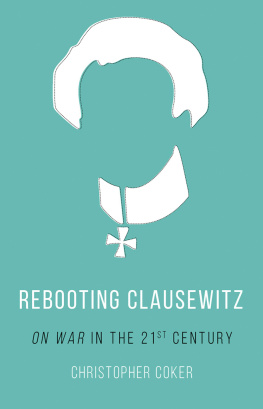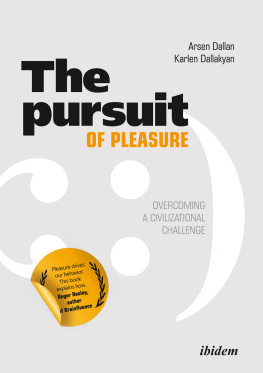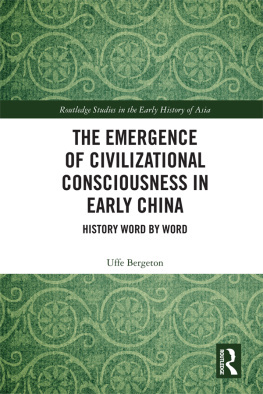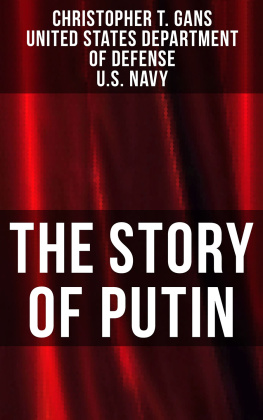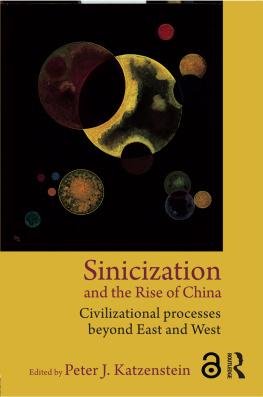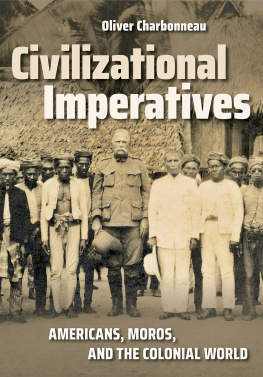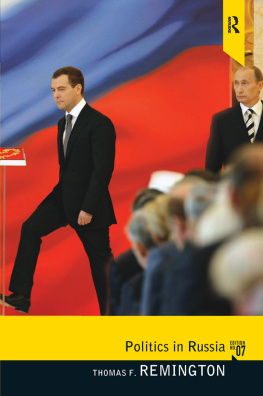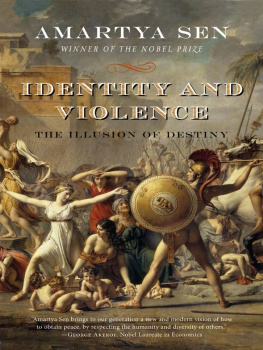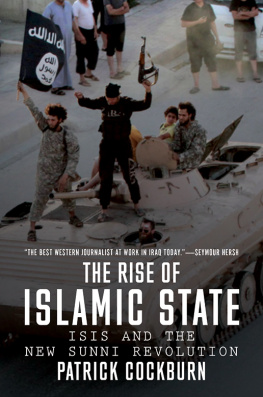
The Rise of the Civilizational State
Christopher Coker
polity
Copyright Christopher Coker 2019
The right of Christopher Coker to be identified as Author of this Work has been asserted in accordance with the UK Copyright, Designs and Patents Act 1988.
First published in 2019 by Polity Press
Polity Press
65 Bridge Street
Cambridge CB2 1UR, UK
Polity Press
101 Station Landing
Suite 300
Medford, MA 02155, USA
All rights reserved. Except for the quotation of short passages for the purpose of criticism and review, no part of this publication may be reproduced, stored in a retrieval system or transmitted, in any form or by any means, electronic, mechanical, photocopying, recording or otherwise, without the prior permission of the publisher.
ISBN-13: 978-1-5095-3464-7
A catalogue record for this book is available from the British Library.
Library of Congress Cataloging-in-Publication Data
Names: Coker, Christopher, author.
Title: The rise of the civilizational state / Christopher Coker.
Description: Cambridge, UK ; Medford, MA : Polity Press, 2019. | Includes bibliographical references and index.
Identifiers: LCCN 2018012972 (print) | LCCN 2018041094 (ebook) | ISBN 9781509534647 (Epub) | ISBN 9781509534623 (hardback) | ISBN 9781509534630 (pbk.)
Subjects: LCSH: State, The--Philosophy. | Nationalism--China. |Nationalism--Russia. | Caliphate.
Classification: LCC JC11 (ebook) | LCC JC11 .C57 2019 (print) | DDC 320.101--dc23
LC record available at https://lccn.loc.gov/2018012972
The publisher has used its best endeavours to ensure that the URLs for external websites referred to in this book are correct and active at the time of going to press. However, the publisher has no responsibility for the websites and can make no guarantee that a site will remain live or that the content is or will remain appropriate.
Every effort has been made to trace all copyright holders, but if any have been inadvertently overlooked the publisher will be pleased to include any necessary credits in any subsequent reprint or edition.
For further information on Polity, visit our website: politybooks.com
Preface
Have you ever given much thought to civilization? It is one of the most important words in the cultural lexicon, but what does the concept actually bring to mind thats of course if it brings anything to mind at all? It is one of those concepts that you are expected to recognize instantly, along with others with which you are probably more familiar, such as the nation-state. Lets imagine that you are a reader from the West. If so, you might identify with Western civilization. But, when you hear that term, what image does it conjure up, if any? Perhaps the great cathedrals of Europe, such as York Minster and Chartres? Or such intense expressions of beauty as the pictures of Raphael (14831520) or Rembrandt (16061669)? Or, as you are making the effort to read this book, perhaps you are better acquainted with a unique literary canon that dates back to the epic poems of Homer?
Possibly you may be more interested in ideas. Is Christianity, for you, still a bedrock of Western civilization, as it was for the poet T. S. Eliot (18881965) when in 1948 he wrote Notes on the Definition of Culture? Or perhaps you are more enthused by secular ideas such as freedom and individualism, which you will find celebrated by Hollywood in films such as 300, Zack Snyders over-the-top account of the battle of Thermopylae. If you believe the historian Herodotus (484425 BCE), claims Victor Davis Hanson (who acted as the historical adviser for the movie), the battle was the centrepiece of a clash of civilizations that set Eastern centralism against a Western belief in individualism (Hanson 2010: 55). Hansons views are not shared by all, and you may fault Snyders film for continuing to propagate an ancient myth that has shaped Western thoughts and feelings over the centuries. Such myths, however, are real enough even if they tend to blur the difference between truth and fantasy in ways that suggest that the boundaries between them may not be as fixed as we would like.
Anyway, you may feel disinclined to regard your own civilization as a Hollywood blockbuster with a fast-moving plot and many leading players, some of them from central casting. You may even be relieved that the Western Civilization 101 courses that used to be part of the standard academic syllabus in the United States were largely abandoned in the 1960s, although on some campuses they are now making a comeback. Perhaps you look at your own civilization through more jaundiced eyes. Back in the 1960s you might have been particularly scornful of those Dead White European Males (DWEM) who are still considered in the popular press to be the founders of your own civilization. The acronym was not, of course, intended to be a mark of approbation. These days it has been superseded by the term WEIRD Western, Educated, Industrialized, Rich and Democratic i.e., the people who still tend to form the bulk of the database in the experimental branches of psychology, the cognitive sciences and economics. For a long time researchers in these fields made the mistake of supposing a species-level generality in their findings. But this is now under challenge. As a Westerner, you may indeed be different from everyone else thanks to cultural and social conditioning. If that is indeed the case, then it can no longer be taken that you speak for the rest of humanity; you may count yourself among the weirdest people in the world.
Of course, whether you identify with Western civilization or not, you will be seen by others to come from a distinctive family, and all families, as we know, tend to exclude others. Other peoples families cut us out of the conversation, sometimes even when we marry into them. Aldous Huxley (18941963), the author of Brave New World (1932), put it rather well in an essay he wrote in the 1920s:
Do you remember Aunt Agathas ear trumpet? And how Willie made the parrot drunk with sops in wine? And that picnic on Loch Etive, when the boat upset and Uncle Bob was nearly drowned? Do you remember? And we all do; and we laugh delightedly; and the unfortunate stranger, who happens to have called, feels utterly out of it. Well, that (in its social aspect) is Culture. When we of the great Culture Family meet, we exchange reminiscences about Grandfather Homer, and that awful old Dr. Johnson, and Aunt Sappho, and poor Johnny Keats. And do you remember that absolutely priceless thing Uncle Virgil said? You know. Timeo Danaos... Priceless; I shall never forget it. No, we shall never forget it; and whats more, we shall take good care that those horrid people who have had the impertinence to call on us, those wretched outsiders who never knew dear mellow old Uncle V., shall never forget it either. (Huxley 1994: 91)
You may not have read Uncle Virgil (7019 BCE) at school (certainly not as, three generations ago, you might have been expected to in the original language, Latin), but if you visit Ground Zero in New York you will find a wall at the lowest level displaying a phrase from Virgils great epic poem The Aeneid: No day shall erase you from the memory of time. And if you visit the wall that contains the remains of the fallen, you will find another quotation from the original poem about two warriors, Nisus and Euryalus, who gladly embraced death for a greater political cause. Its a noble enough sentiment, isnt it? But, if truth be told, it is also a rather ironic one. Doesnt it, asks one writer, fit the hijackers of September 11 more closely than their victims? (Crawford 2015: 51516).
Next page
